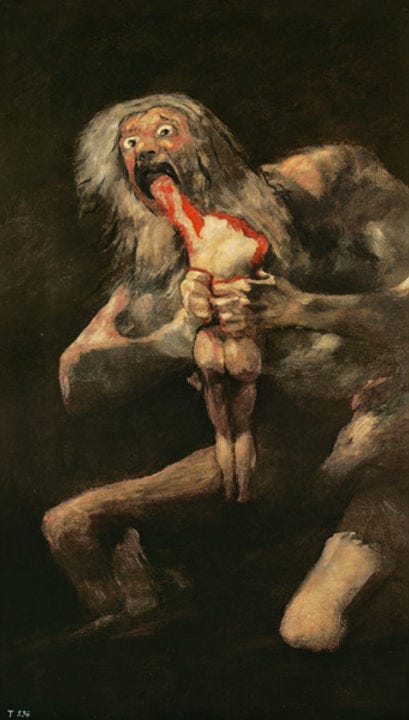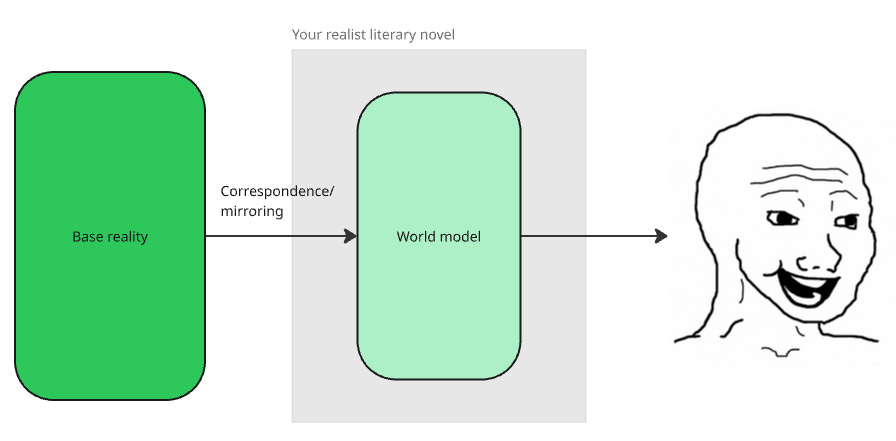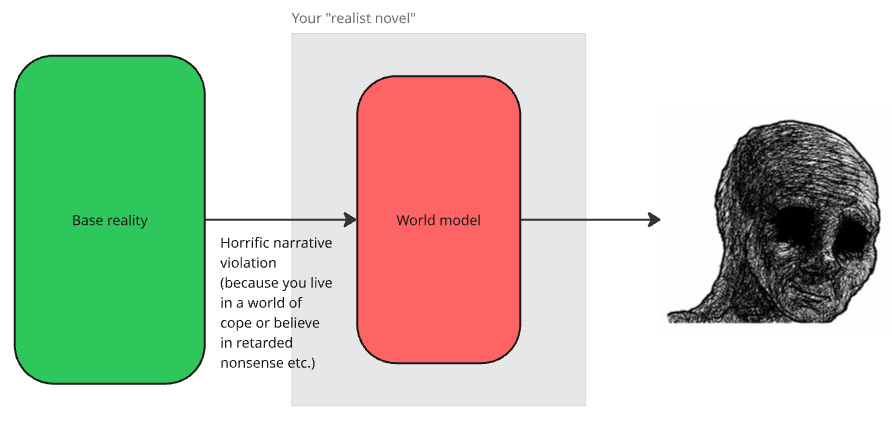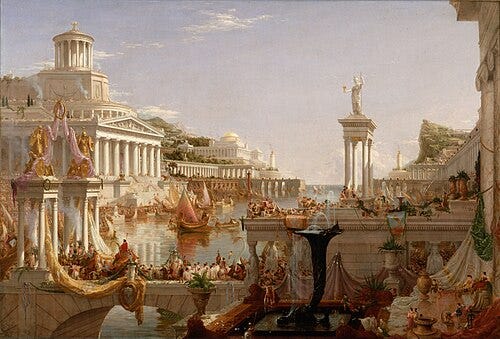Literary persuasion as narrative contamination
"Excuse me, but there's some PERSUASION in my story, can you please SEND IT BACK???"
Whenever I return home to visit the US, I make it a point to drop in as many bookstores as I can. I enjoy the process of following the literary discourse online, but the digital avant-garde takes time to bleed into the physical world.
Like a weather vane pointing in a particular direction, a physical bookstore is a lagging indicator, snapping to alignment with the zeitgeist by way of its literary presentation.
Both in large chain bookstores and small independents, these shelves of recommendations represent a safe consensus, with the placement and emphasis of their various novels-for-sale signaling some combination of cultural and commercial incentives—status rewards and monetary rewards, respectively.
I haven’t yet detected any discernible change in the orientation of these physical signals, but I think something significant is happening in the world of letters.
Rather than call this a “vibe shift,” let’s try to be more precise with our descriptors: we are currently—thanks largely to Substack—in the middle of a shift in the Aesthetic Overton Window in the world of letters.
The beatings will continue until Vuong improves
Ocean Vuong is getting a lot of criticism these days, but it’s not in the context of anything like a literary cancellation.
Rather, Vuong is being criticized for aesthetic reasons.
(For a great piece on this, I suggest Sam Kahn’s latest).
Rather than frame these critiques as critiques of wokeness qua wokeness, I think something more fundamental is happening.
I think, in part, we are living through a crisis of Liberalism that is being triggered by the unraveling of the central moral legitimating narratives of the global American empire.
My view is that these two things are inextricably connected and essentially continuous with one another.
As one comes apart, so too does the other.
This unraveling is a manifold, complex event driven by several interlocking trends in finance, trade, geopolitics, and most importantly in political meta-narratives. This collapse in narrative management is driven by all kinds of factors, but the US-backed genocide of Gaza and the extraordinarily systematic depth of the Epstein scandal stand out as two central forces.
I’m starting to feel that the cognitive dissonance these two events trigger for American exceptionalism among leftist and rightist camps threatens the foundational structure of Liberalism itself.
If the Purpose of a System is What It Does, then elite American institutions are demonstrably optimized for the feeding of two serpentine entities: Blood for the Blood God, and Cum for the Cum God.
If human rights are the North Star of the Liberal project, then why are we moving heaven and earth to help our Most-Favored-Ethnostate liquidate tens of thousands, hundreds of thousands of children?
What does democracy mean if you can’t even functionally vote to stop a genocide? What do laws mean when the government doesn’t even bother to wipe the metadata from the security camera footage outside of Epstein’s cell?
Do you understand that they’re laughing at you?
What kind of moral authority could possibly reside behind a podium with the seal of a state that does all of these things and yet still claims moral leadership over the entire planet?
Is it just me, or do you feel like you’re going insane?
I think it’s in light of this crisis that all kinds of narrative threads are snapping, suddenly and violently.
I think, on some level, people are getting this now.
The problem with Vuong, in my view, was not really his overwrought aestheticism.
It was always that he didn’t go far enough.
If you want to understand the Vietnam War, I don’t think you’ll find it in Vuong’s poetry. You’ll find it in Nick Turse’s Kill Everything That Moves and you’ll understand the level of the atrocity, and then you’ll wonder how Liberalism ever survived the act of torching millions of people alive.1
Maybe it’s because they couldn’t record their bodies burning on smartphones.
Don’t try to persuade me of the truth—show me that you know it to be true
Back to the bookstores, where we are reaching a saturation threshold for repetitive visual fatigue. The sameness even extends into the bland, repetitive designs of the covers themselves: bleached with the same bright pastels and self-important minimalist typography.
I’m going to propose a hypothesis that combines my prior critiques to those of David Herod at Tooky's Mag: the problem with moral didacticism in literature is not the moral epistemology itself, but the lack of conviction in it, which requires the writer to contaminate his story with a form of persuasion.
(who is being persuaded? why—the writer themselves, of course!)
While there is certainly a craft and aesthetic beauty to many of these works, the career of the modal elite fiction writer in this generation might be better modeled as the behavior of a 'moral entrepreneur' rather than an artist outright.
Is the purpose of a novel to tell a story or is the purpose of a novel to convey a moral lesson?
More importantly—are we, as citizens of the global American imperium—in any sort of position to impart moral lessons?
To ask the question is to answer it with our own deep-seated intuitions: any story that tries to hard to persuade its reader has compromised itself. More often than not, novels that lean too hard into alignment with leading edge secular progressive morality fall into this trap: the trap of contaminating the aesthetic object of the narrative with that of literary persuasion.
The consequences of this regime of aesthetic homogeneity have been severe.
The form of literary fiction has the problem of dual-decline. As the masses slip into the dopamine slavery of hyper-optimized consumer smartphone apps, the world of letters increasingly falls under the domain of our cultural elites—elites who are generally more sensitive to the homogenizing forces of this aforementioned culture of purity.
The effect is to compound the decline of an already declining art form, subverting any possibility of rejuvenation and regeneration.
As easy as it would be to levy a conservative critique and pin the blame on "woke-ism," the current dominant paradigm of secular progressive morality is only one instance of a general and even more fundamental facet of human psychology.
There are multiple reasons for this, but let us discuss only one.
World-models and the implicit world-building of the literary novel
The core problem with turning a novel into a parable about woke-ism or any other ideological system is that the "moral lesson" embedded in the text grows beyond the natural boundaries of an organic literary theme. In so doing, it hypertrophies beyond the dimensions of its natural shape and placement within a narrative, exerting a "reality distortion field" that warps any sense of narrative verisimilitude.
Let me explain.
Insofar as a novel must present a coherent setting, it must also present a literary world model.
A “world model” is simply that which its name implies—a model of the world. When a narrative is pulled into the gravity of an overbearing ideological framework, the world models gets distorted: inconvenient facts, characters, and human flaws get flattened and shorn off, flattening the complexity of the world model and widening the gap between the complexity of real life and the *representation* of 'real life' in the novel.
In a sense, this is the job of the sensitivity reader: the identify and amputate any narrative violations that exist in a pre-publication novel. If features of the literary world model conflict with the ideologically-charged world model of leading-edge secular progressive morality, they are cut out entirely.
I think things are slowly getting better now.
It used to be that racial minorities could only be depicted in the strictest possible terms, with their narrative presentation serially gate-kept by a sequence of editorial chokepoints that sifted out any deviation from the proper presentation of that layer of the intersectional stack. A book like Andrew Boryga’s Victim couldn’t get published at the peak of this trend.
Reality, then, is a more complicated thing than tribalism seeks to admit.
Art inherently resists instrumentalization. There is a tradeoff between the degree to which a narrative acts as an instrumental tool for persuasion and the degree to which it exists for its own sake, as an end unto itself (e.g. propaganda has less artistic merit).
Where do we go from here?
Literary fiction, like other art forms, progress through waves of trends. By definition, any current trend is temporally limited. If we consider the zeitgeist as a form of collective consciousness, we can broadly intuit its shape and directionality. Like any sort of natural rhythm that ultimately finds it tether in biology (i.e., in the human animal), literature progresses through alternating cycles of rising and falling (we might call this ‘Kali-Yuga-Wordcel-Theory').
The salient question—now that we have fallen—is how we might rise.
Many artists are counterculturally-inclined, so one potential result would be for "anti-woke" literary fiction to become the new trend.
The problem is that this is not a solution: my experience has been that explicitly coded "anti-woke" narratives—whatever their form—tend to be terrible.
(By the way, I think writers like Adem Luz Rienspects or Dan Baltic being pinned as “anti-woke” in a recent editorial headline is largely inaccurate, although I understand why Rolling Stone needed a headline like that drive clicks)
The problem with the culture war vis-a-vis art is not that these topics aren't salient or that they don't relate to important questions of morality and human values, but that instrumentalizing literary fiction to the role of a military unit in the culture war mistakes the purpose of the novel altogether.
In philosophy, this is referred to as a “category mistake”— erroneously placing one thing (persuasion) into the category of another (narrative). Regardless of the ideological content, this is a form of contamination. Ayn Rand's books may be best-sellers, but it's not because they are good stories—rather, they are compelling forms of propaganda.
What we need is to reintroduce chaos, jouissance, and moral complexity to literary fiction—to reduce the 'ideological quotient' of the art form as opposed to merely changing its valence.
A truly generative paradigm shift is not merely a reaction to the existing paradigm, but an orthogonal move away from the paradigm altogether.
The cynical counterargument is that such a move constitutes a form of moral evasion and a refusal to articulate any notion of human values in a literary work.
Herein lies another error: I'm not in favor of completely abdicating any attempts at moral discourse in the novel, but I am for permitting a greater degree of general openness: an openness to infusing moral complexity, ambiguity, and ideological contradiction back into the top-tiers of literary fiction.
And most importantly, if you believe something to be true, you should know it to be true, and that knowingness should organically emerge in the world model of reality you’re building there.2
We can imagine this as a kind of freedom: a freedom to weave these threads of contradiction and mirror the stubborn messiness of the world as it presents itself to us.
Chaos is the thing that is missing from our over-credentialized, overly-academic literary elites.
I’m a coward—true—but I’m not wrong in my diagnosis.
We need more Mishimas, I think. We need artists who are ready to burn their lives down.
Whether we find it in a flock of birds or the rippling surface of the ocean, it is chaos that connects us to “white hot center” of our emotional selves as writers. Herein comes a narrative spooling out of your chest without the hyper-analytical sequence of purity tests acting as an immediate censor of what is being born, cutting the cord to the energy connecting you to your own work.
I do not and have not ever believed in notions of permanent literary decline. A new wave of fiction is emerging: writers who are not directly concerned with constructing a didactic “woke/anti-woke” normative moral framing, choosing instead to bypass it altogether.
By virtue of this disregard, their works fail to land cleanly on one category or the other, organically accumulating contradictions as these manuscripts grow and mature over time.
This is the syncretic beauty of nature: of its manifold layers of fractal contradictions.
It is only right that we do it justice with words.
Multiple times, mind you.
Moral anti-realists BTFO










If you have a story, tell it.
If you don't, write it.
The cognitive dissonance of unraveling brutalist empire as moral authority is very a strong point, and you make it well. The narrative of our lives is completely off. So much of woke-anti-woke nonsense seemed to me to be a guilty conscience of empire vs a “realist” embrace.
I’ve read a lot on here about the state of fiction and the rise/fall of auto fiction. You mentioned something about Vuong not going far enough. I think this is part of all of it. It has to go farther than gesture. Despite our so called hyper individualism and solipsism, I feel that our own subjectivity is as poorly understood as ever. More than just awakening to the truth of empire, we have to fight off an external, top down technologically imposed schizophrenia. Our lives appear mundane, but they’ve actually become impossible, untethered from reality, dreams within dreams.
Sorry for the long comment. Your article tied some threads together for me.
Thank you